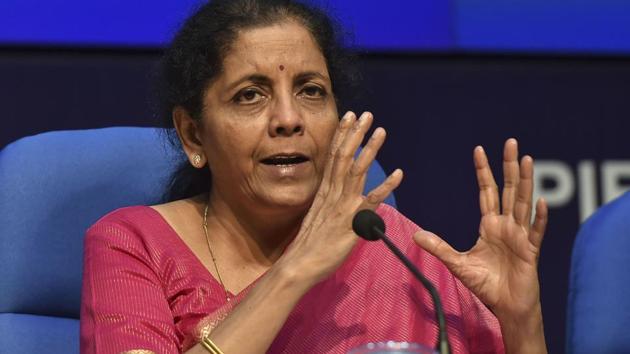Peak taxation rate of 42.7% not ideal: FM Nirmala Sitharaman
Ideally, the peak income-tax rate of 42.7% should come down over time, finance minister Nirmala Sitharaman said on Thursday in an interview, repeating and stressing the word “ideally”.
Ideally, the peak income-tax rate of 42.7% should come down over time, finance minister Nirmala Sitharaman said on Thursday in an interview, repeating and stressing the word “ideally”.

“We will have to see when the timing is proper” to bring it down, she added in response to a specific question whether, in principle, she thought this was too high a tax rate for a country such as India.
Sitharaman said that the tax on the super-rich enforced in the Union Budget announced on July 5 was driven by the need to part-raise resources for important and essential government expenditure.
Read full interview here.
The super-rich tax, which took the form of a surcharge of 25% on the tax of people who earn between Rs 2 crore and ~5 crore, and 37% on that of those who earn over Rs 5 crore, has roiled Indian stock markets after it emerged that around 40% of foreign portfolio investors (FPIs) route their investments into India through trusts, which attract the same tax as individuals.
Sitharaman said that there was always an option for such investors to route their investments through a company (the corporate tax rate is 25% for companies with annual revenue less than Rs 400 crore) but added that she is also aware that this conversion is “painful”.
Responding to a question on whether she would do something about this, the finance minister said that she was merely laying out the issue and that she has “not taken a call on it”. Sitharaman, however, did clarify that FPIs “were not the target” of the tax.
Both the budget and the economic survey that preceded it stressed on the importance of private investment to revive growth and help India become a $5 trillion economy.
Also read | Nirmala Sitharaman offers to play ‘class teacher’ to clarify Budget concerns
The finance minister said she believes enough has been done to attract private investment – from easier foreign direct investment (FDI) rules to highlighting specific areas such as railways where private investment is now welcome to creating headroom for private firms to borrow by taking some of the government’s own requirements overseas. Sitharaman also stressed on the “non-money messages” in her budget speech, specifically “reforms”.
Ahead of the budget, there was talk in some circles that it would be entirely understandable if the government slipped a bit on its fiscal deficit target for 2019-2020 because the primary concern right now is to revive growth.
The finance minister said she was aware of this argument, admitted that it was a credible one, but added that there was no question in her mind of breaching the fiscal deficit target. “I had an FRBM (Fiscal Responsibility and Budgetary Management Act) before me, and as a minister it is my business to comply with it,” she said.
Budget 2019-2020 has estimated that the fiscal deficit for the year will be 3.3%.






